- Home
- Tad Williams
Sleeping Late on Judgement Day Page 7
Sleeping Late on Judgement Day Read online
Page 7
Highway 1, or at least that section, was still a pretty basic old road: you didn’t need to wait until the next exit to get off. I turned in front of the rusting horse and onto a dirt road that I wouldn’t have noticed otherwise—really not much more than a two-wheel track. I followed its curving course in the general direction of the Pacific, which sprawled across most of the horizon except for the spit of land I was navigating. I wound through a stand of very old eucalyptus trees; the scent that wafted through my opened windows was like the world’s largest cough drop. Then the road climbed, and I could see that I was approaching the top of the promontory, which was all evergreens, pines, and cypresses tangled together. There was no sign of a house.
But when I got to the edge of the promontory, I found that the road didn’t end there. Instead, it narrowed even more and wound down the front of the tree-covered bluff. After following a bend and finding myself looking down a steep sandstone cliff to the ocean and white-frothing rocks below my passenger-side door, I finally saw the house, tucked into the hill just to my left, and facing the water.
The building didn’t seem strange at first, just a large, three-story white house with a high A-frame roof pressed back into the hillside, totally hidden from the highway by the trees. But as I got closer I saw that there were quite a few other buildings on the property, including a group of perhaps a dozen smaller houses—cabins, really—set out in straight lines on a level further down the hill.
I parked on the gravel drive. No other cars, which I hoped didn’t mean this Gustibus guy had decided to run down to Pescadero for a crate of artichokes or something, and I was going to have to come back another day. It was cold by the front door, with nothing between me and the late autumn wind off the Pacific, so after I banged the heavy iron knocker I pulled up my jacket collar while I waited.
I was beginning to wonder if I’d been right about the emergency artichoke safari when someone finally opened the door. It was a woman, two hundred years old if she was a day, wearing a long, tentlike black dress, like a mourner at a RenFaire funeral. Her black headgear was flat on the top, with a veil hanging down all around that left only her face visible. She looked at me as though she didn’t meet many actual people.
“I’m here to see Dr. Gustibus. My name is Bobby Dollar.”
She nodded. That took so long I thought halfway through I was going to have to oil her like the Tin Woodman. “Come vith me,” she said, then turned and shuffled away. Another one with an Eastern European accent. Was this Act Out Your Favorite Hammer Horror Movie week or something? Had I missed an announcement?
We went through a short hall and the old babe in black knocked and opened a door before stepping aside to let me enter. The room was really something. Not architecturally or anything—it was a big old plain barn of a place on the inside and looked like the last serious work done to it had been a century ago—but because of the books. I’d never seen anything quite like it. All through the main room, which must have been a good forty or fifty feet long and more than half that wide, and whose ceiling was clearly the second floor ceiling in the rest of the house, shelves lined the walls almost to the very top. A huge variety of makeshift ladders stood against the shelves, some nice ones with wheels that had been built to go with the shelves, others crude products that looked like they’d been thrown together for dunking suspected witches. At the center of the room stood a huge refectory table, also covered in books, and various other surfaces had been similarly buried. The few spaces not covered by books were crammed with other things—bones, jars, painted stones. Except for the obvious fact that some of the volumes were extremely old, the whole place looked like a second-rate museum had staggered in here and thrown up.
At the far end of the room, in front of a modest fire burning in a fireplace as big as my bedroom—the kind of fireplace you cooked whole cows in and then fed them to your knights and squires—stood a figure dressed in what I thought at first was a white lab coat (but which on closer inspection was some kind of vaguely Eastern-Guru thing, all loose-fitting linen); a figure that I could only presume was . . .
“Doctor Gustibus? Hi, I’m Bobby Dollar. Edie Parmenter told you I was coming, I think.”
He carefully marked his place before he set the heavy book down, giving me time to look him over. Gustibus was certainly one of the more interesting people I’d seen lately (outside of Hell, of course, where they play a high-stakes version of “interesting”). He was tall and slender, and—speaking of Hammer Horror—he looked a bit like a middle-aged Christopher Lee, with bone structure for days. His long, white hair was pulled back in a ponytail, and he had a tiny tuft of white beard on his chin.
He looked past me to the doorway where the old woman was still waiting and said, “Thank you, Sister,” in a voice like a veteran actor, all stretched vowels and precise consonants.
“Sister?” I asked. “Your sister?” Because she looked too old to be his grandmother, let alone his sister.
He showed me a wintry smile. “No. Sister Philothea is a nun. Was a nun. It’s complicated. For all of them.” He followed up this confusing explanation by extending a long, pale hand. “I am Doctor Karl Gustibus. And you are Doloriel. I’ve been waiting a long time to meet you.”
It was a full second and a half before what he’d said hit me, but when it did it was as though Bald Thug had just slugged me in the breadbasket again. “Dol . . . Doloriel? I’m sorry, but my name is Bobby Dollar.”
“Yes, Mr. Dollar. I know.” He still wore that little half-smile, but his eyes seemed as cold and remote as stars in the night sky. “But I know your other name too. And I suspect I know why you’re here, as well. You’ve been having a little trouble with the folks in Heaven lately, haven’t you? A little . . . unpleasantness.” The smile winked off. “Or, knowing some of the players at least a bit, I’m guessing it’s rather a lot of unpleasantness.”
I couldn’t think of a single thing to say, and that doesn’t happen to me much. So I grabbed for my gun.
eight
braincramp
I POINTED THE Belgian automatic at his chest. Alarms were going off in my head, telling me I’d walked right into some kind of trap like the greenest rookie angel who was ever sent out to find a halo-stretcher his first night at Camp Zion.
“Pardon me,” I asked, “but exactly who the fuck are you, and how do you know any of that?” I’m afraid I wasn’t as calm and cool as I’d have liked to be, so if you’re my biographer, please fix that part.
Gustibus didn’t jump back or freak out, but he did look like he took the gun seriously, which was a relief: half the bastards I’ve drawn on lately didn’t even seem worried. That’s what happens when you hang out with demons and loonies, I guess. “Please point that somewhere else,” he said. “You don’t need it here.”
“I’m only going to ask one more time. How do you know that name?”
“I know lots of names. It’s what I do.” He gestured to the books that covered every surface and nested along the walls in thousands, like sea birds on the cliffs. “I am a student of sorts, Mr. Dollar. A researcher, like your friend Mr. Noceda, who is always interested in what the infernal powers are up to. The difference is that I have instead devoted my time to a study of Heaven and those who rule there.”
He knew about me, and he knew about George the Info Pig. What was up with this guy? I didn’t get it, but I couldn’t just keep waving the gun at him when he wasn’t doing anything except cooperating. Unfortunately, there’s no cool way to put your gun away again. I thumbed the safety on and slipped it back in my pocket. “Okay. But keep talking.”
“I’ve been wanting to meet you for a while, actually. When Edie said you wanted to ask me some questions—well, it seemed like Fate.”
That made me itchy. “Why did you want to meet me?”
“Let’s not hurry ourselves.” He walked past me to the window and stood looking out at the ocean. “Did Ed
ie tell you anything about me?”
“Not a thing. Just your name and how to get here.”
“She’s a good girl.”
I didn’t know what to say to that, so I just watched him. “Look, are you going to give me any information about the auction at Islanders Hall?” I said at last. “That’s why I’m here.”
“Oh, if that’s all you want, I’ll be happy to do it. But I can tell you much more. Why don’t you sit down?”
There was no obvious seating area, just a few chairs scattered around the room, all covered with old volumes and strange objects. Gustibus scooped a few books off the nearest, moved those to another, equally cluttered surface, then gestured. “Please, don’t wait for me. I never sit.”
This guy kept coming up with things that just shut me up. I wasn’t used to it. I sat.
“So?”
“I’ll happily tell you about all the other participants in your auction for the angelic feather, although I’m surprised you didn’t keep your own notes.”
“It got a little busy there,” I said, thinking of Eligor’s soldiers and the huge, burning thing called a ghallu. It had indeed been quite a night.
“Fine. Then as a gesture of good faith—” He proceeded to name everyone who’d been there, including several Edie had forgotten, and to give me a quick capsule biography of each. None of the names or facts gave me any new thoughts on where Anaita might have hidden Eligor’s horn, so I asked him about the Black Sun Faction.
“I know a little about the Black Sun, yes,” he said. “They are all human as far as I know, but a most unpleasant group of humans. Several murders have been ascribed to them, as well as countless arsons, robberies, and other crimes. They are political fanatics, the truly dangerous kind. But they were not at the auction or connected in any way, as far as I know.”
“How about Foxy, then? Mister Fox, the guy who put the auction together—do you know anything about him? Who is he? What is he?”
Gustibus showed me a slight smile. “I’m fairly certain he’s exactly what he says he is. A fox.”
“Um . . . does that mean you find him sexually attractive? Or that he’s actually a small doglike predator with a bushy red tail?”
“Not an ordinary fox. A fox spirit. From Japan, originally, but you know how crowded that country is. I’m reasonably certain he immigrated here a dozen years ago or so.”
“A Japanese fox spirit who deals in stolen supernatural goods from a street corner in downtown Jude?” I shrugged. “Why not? Nothing else makes any sense, so why should he?”
I assume my expression was pretty easy to read, because Gustibus smiled again. “But as I suggested, Mr. Dollar, I can tell you more useful things than that, especially in your current situation. Shall we bargain?”
“Bargain?”
“Oh, come. I’m a collector. I don’t give things away.”
I adjusted my position so I could reach my gun quickly if I had to. “And what do you want in return? Don’t tell me—it begins with S and ends with O-U-L.”
He shook his head, his expression like I’d just broken wind. “Please. I’m not on that side. I’m not really on either side, although both have more power over me than I’d like.” He lifted a fat folio off one of the windowsills and held it out, spread open. The page on top was covered with spidery lines and tiny little notes. “Please, come closer so you can see.”
I edged my chair forward, still not sure of him and not wanting to be within arm’s reach. Not that Gustibus seemed particularly dangerous—actually, he looked a bit like some kind of skinny, Buddhist-Druid version of Santa Claus—but he was tall and his movements suggested he could be quick when he wanted to be.
I squinted because I was still a couple of feet distant. “It looks like a map of San Judas.”
“Actually, it’s a map of the whole peninsula south of San Francisco, down to Alviso. Do you recognize any of the names written on it?”
Now I really had to squint. I gave up at last and got off the chair. The map had been divided with blue pencil lines into little territories. Right over downtown Jude, at the center of the map, in a blue square labeled, Masonic Lodge, and then below it, Now Compasses—taproom, was a list of names. Nahebaroth was the first one—my old off-and-on sweetie Monica Naber’s real name. Beneath were was a couple of dozen others, including Sammariel and Doloriel—yeah, me. I looked up at Gustibus, surprised at how hard my heart was beating. “We’re all on there.”
“You certainly are. That represents years of work. And if you notice the names grouped around the bar on Parade Street called The Emergency Room, you will notice that they are members of the opposing tribe.”
I looked. The crabbed black letters listed Smearhawk, Rotwood, Weepslug, and several others that I recognized, most of them infernal prosecutors. There was even a note for Shitsquelch, the fanboy prosecutor I’d met that morning. “I don’t get it. What is this?”
“What is it? History, Mr. Dollar. Some men spend their entire lives studying just the Battle of Bosworth Field or Marathon, others take a larger view and make the entire War of the Roses or Peloponnesian struggle their area of interest. But the struggle that fascinates me is ongoing. It is the war between Heaven and Hell.”
“You’re a historian?”
He shrugged. “Of a sort. It’s a field of study pursued by a small number of researchers, all of us with far more to do than we can ever hope to accomplish. But the quest for knowledge does not relax its standards because of the inadequacy of its devotees.”
I was really beginning to wonder who this guy was. I’d never heard of him, and yet he’d apparently been around for a while. Was he human or not? “So what could you possibly want from me?”
Gustibus actually looked surprised. “Why, information, of course. What else? I have had very few chances to interview any of the actual combatants in this eternal struggle. In return for answering my questions, I can help you find what you’re seeking.”
“And how do you even know what that is?”
He put the folio back on the windowsill and picked up a little bell with a handle, then shook it briskly. “I know a great deal, both about your struggle with Eligor the Horseman and your current problems with—let us be discreet—certain of your own comrades. I assure you my methods are nothing sinister. I seek out and buy information—some of it in the form of the books you see here,” he waved his hand, “but also intelligence that can only be discovered thanks to modern technology.” He gestured again, this time at a pretty nice desktop computer perched at one end of the refectory table. “But I do not simply gather information, Mr. Dollar—I study it.”
The door of the huge room opened, startling me a trifle, and another little old nun came in. I only knew it wasn’t the same one because her headgear was different, more of a straight wimply-veil thing that fitted close to her head.
“Sister Kassia,” Gustibus said, “Will you bring some refreshment for our guest and myself?”
She nodded and tottered out again like something brought only partially to life by an underachieving mad scientist. I was too nonplussed to think of anything to say about all the things Gustibus had just told me, so instead I asked, “What’s with all the nuns?”
“This property was a Russian convent when I bought it in 1947,” my host said. “The building itself was deconsecrated, but for various reasons having to do with politics and other things, many of the nuns had nowhere to go. I let those who wished to stay remain here. They help me around the house, they tend the gardens—we grow most of our own food. We have received a few novices over the years, but most of the original group have died. I’d say there are only a dozen or so left out of what was once a congregation of nearly a hundred.”
So he’d bought the place in 1947? That was well over sixty years ago, and he didn’t look like he could be any older than that himself. Who was this guy? I didn’t get a Hell
-vibe off him, but that didn’t mean much. You almost never did, unless they wanted you to. Maybe Gustibus was like my gunsmith friend Orban, who claimed to have lived centuries by the simple expedient of refusing to die.
I meet all kinds, I’m telling you.
Sister Kassia came back sooner than I would have expected, and set out a tray with a pitcher of ice water, a large bunch of grapes, some bread, and a wedge of white cheese.
“Try it,” urged Gustibus. “It comes from our own goats.”
I took a little, just to be polite—it was actually pretty good—and poured myself a glass of water. After popping a few grapes, I took my chair again. “If we did make this bargain, what kind of . . . information do you want? I mean, I don’t know you well at all, but to be honest, there are a lot of things I couldn’t or wouldn’t tell you even if I did.” Why should I trust this new guy Gustibus? I still didn’t entirely trust Clarence, even though he was another angel and Sam liked him.
“I don’t want names,” Gustibus said. “As you can see, I have my own sources for those. But what my sources can’t tell me is what it is actually like to be an angel of the Lord. I would like to ask you questions about your experiences, your day-to-day routine. In return, Mr. Dollar, I promise I will give you information that will help you—perhaps even make it possible for you to locate the rather unique horn you’re looking for.”
It was the first time he’d mentioned the horn, and the first time I’d had solid confirmation that Eligor’s token really was the thing everyone was interested in. I was relieved to know I’d been right, but I still took a moment before replying, since sharing with someone I’d just met felt like stepping off onto something shaky. “The horn, right. Do you know where it is?”

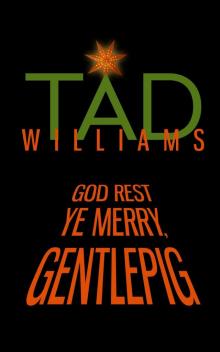 God Rest Ye Merry, Gentlepig
God Rest Ye Merry, Gentlepig Tailchaser's Song
Tailchaser's Song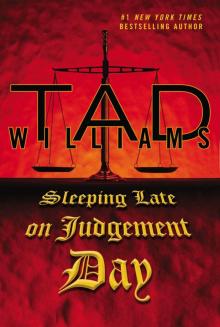 Sleeping Late on Judgement Day
Sleeping Late on Judgement Day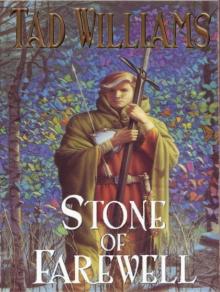 Stone of Farewell
Stone of Farewell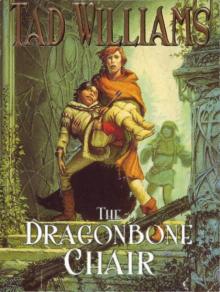 The Dragonbone Chair
The Dragonbone Chair Sea of Silver Light
Sea of Silver Light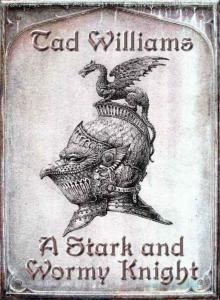 A Stark and Wormy Knight
A Stark and Wormy Knight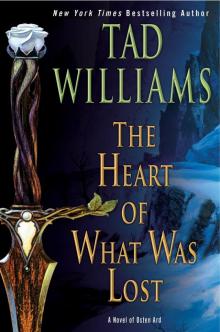 The Heart of What Was Lost
The Heart of What Was Lost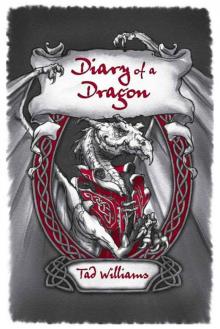 Diary of a Dragon
Diary of a Dragon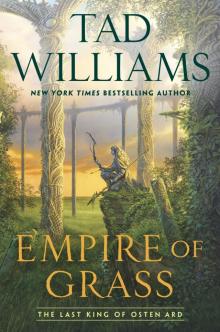 Last King of Osten Ard 02 - Empire of Grass
Last King of Osten Ard 02 - Empire of Grass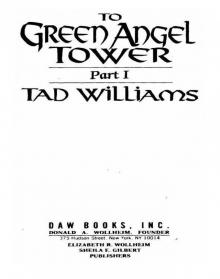 To Green Angel Tower, Volume 1
To Green Angel Tower, Volume 1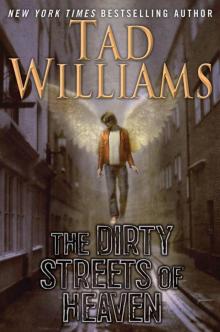 The Dirty Streets of Heaven
The Dirty Streets of Heaven River of Blue Fire
River of Blue Fire The Very Best of Tad Williams
The Very Best of Tad Williams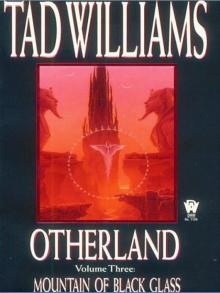 Mountain of Black Glass
Mountain of Black Glass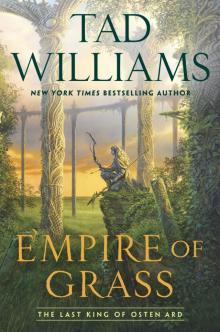 Empire of Grass
Empire of Grass City of Golden Shadow
City of Golden Shadow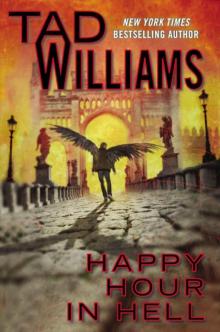 Happy Hour in Hell
Happy Hour in Hell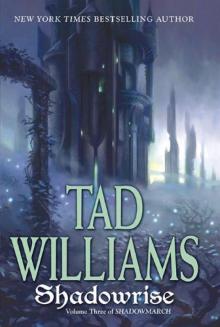 Shadowrise
Shadowrise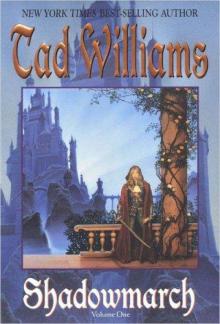 Shadowmarch
Shadowmarch Brothers of the Wind
Brothers of the Wind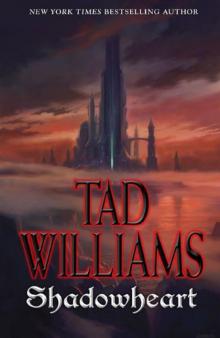 Shadowheart
Shadowheart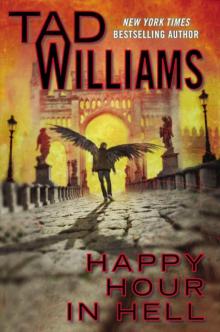 Bobby Dollar 02 - Happy Hour In Hell
Bobby Dollar 02 - Happy Hour In Hell The War of the Flowers
The War of the Flowers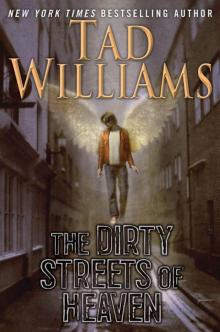 The Dirty Streets of Heaven bd-1
The Dirty Streets of Heaven bd-1 Tad Williams - The War of the Flowers (retail) (pdf)
Tad Williams - The War of the Flowers (retail) (pdf) Shadowheart s-4
Shadowheart s-4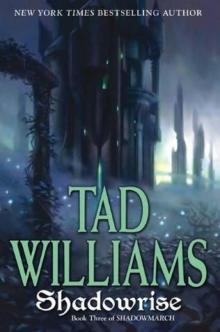 Shadowrise s-3
Shadowrise s-3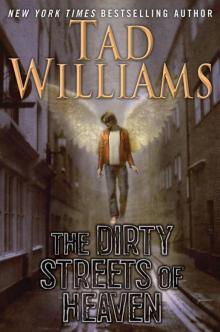 The Dirty Streets of Heaven: Volume One of Bobby Dollar
The Dirty Streets of Heaven: Volume One of Bobby Dollar The Stone of Farewell
The Stone of Farewell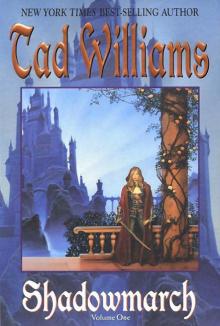 (Shadowmarch #1) Shadowmarch
(Shadowmarch #1) Shadowmarch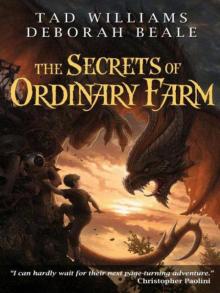 The Secrets of Ordinary Farm of-2
The Secrets of Ordinary Farm of-2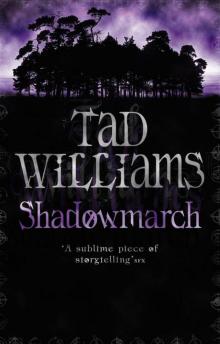 Shadowmarch s-1
Shadowmarch s-1![Bobby Dollar [04] God Rest Ye Merry, Gentlepig Read online](http://i1.bookreadfree.com/i1/04/06/bobby_dollar_04_god_rest_ye_merry_gentlepig_preview.jpg) Bobby Dollar [04] God Rest Ye Merry, Gentlepig
Bobby Dollar [04] God Rest Ye Merry, Gentlepig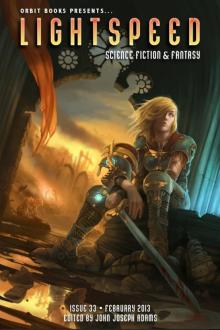 Lightspeed Issue 33
Lightspeed Issue 33 Sea of Silver Light o-4
Sea of Silver Light o-4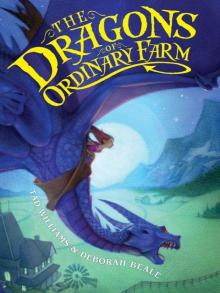 The Dragons of Ordinary Farm of-1
The Dragons of Ordinary Farm of-1 Shadowplay s-2
Shadowplay s-2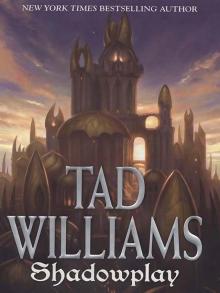 (Shadowmarch #2) Shadowplay
(Shadowmarch #2) Shadowplay